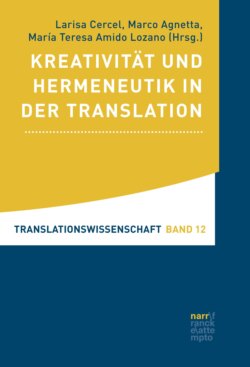Читать книгу Kreativität und Hermeneutik in der Translation - Группа авторов - Страница 20
Kreativität beim Literaturübersetzen. Eine Bestimmung auf rhetorischer Grundlage
ОглавлениеRainer Kohlmayer (Mainz-Germersheim)
Abstract: The type of translational creativity identified in think-aloud-protocols of students is only of minor interest for literary translators. Creativity in literary translation has never been limited to the discovery of intelligent solutions for individual linguistic problems. The essay tries to widen the perspective by referring to the rhetorical method of producing oral or written texts. Rhetorically speaking, the translator’s task starts only at the third stage of text production (elocutio) whereas fully-fledged creative writers start out with finding a plot (inventio) and deciding on its structure (dispositio). On the other hand, the stage of elocutio (or style as it is called most of the time) may be considered to be the creative synthesis of any literary work, integrating not only the two preceding stages but also predetermining, or, at least, trying to influence the way a text is to be read aloud or performed silently in the future reader’s mind (pronuntiatio/actio). The German poet-philosopher Novalis (Friedrich von Hardenberg), a close friend of Friedrich and August Wilhelm Schlegel, considered style to be the rhetorical declamation inscribed into the text (“die schriftliche Stimme”), thus linking the traditional rhetorical approach with the modern age of anonymous readers. In the mainstream German tradition, starting with Herder, literary translators have consistently tried to imitate the “voice” of a text, combining a considerable amount of philological research with the creative art of coherent mental mimicry. The practical side of this approach is illustrated by examples taken from the well-known German translator Hans Wollschläger (1935–2007). Unfortunately, this great rhetorical tradition of literary translation has been ignored by most schools of modern translation theory, whether they were of structuralist, functionalist, or cognitivist origins. Small wonder, then, that literary translators often deny the usefulness of theory. There are, however, clear signs of a new and mutual learning process.
Keywords: Literary translation, creativity, rhetoric, written voice, mimesis.
